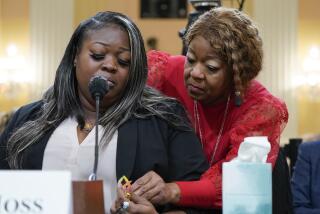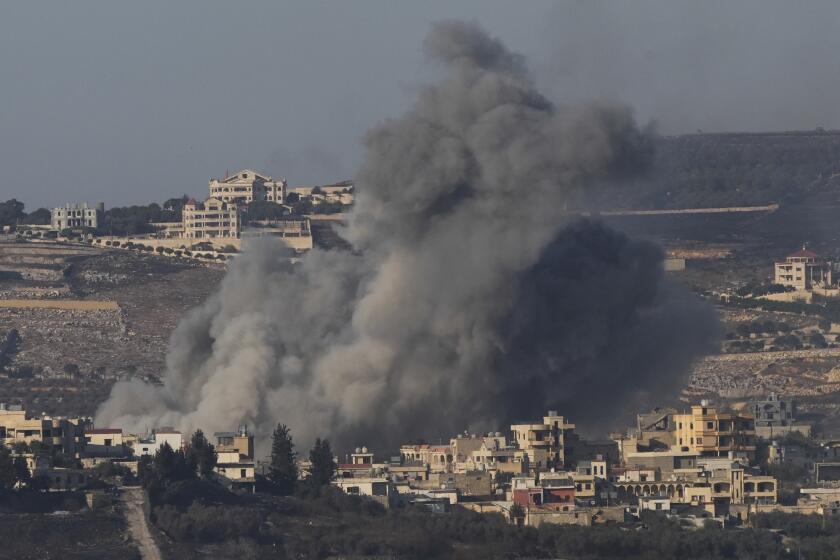Hong Kong Ruffles ‘Golden Goose’
Before Hong Kong passed from British to mainland Chinese control in July 1997, the big fear was that the considerable political and press freedoms enjoyed here would be endangered under the new regime.
There was less concern, even among the most alarmist critics, that Hong Kong’s vibrant market--long rated one of the freest in the world--would be compromised. The free market and hands-off government policies were considered too much of a Hong Kong hallmark--indeed, the very key to the territory’s remarkable half-century of uninterrupted growth.
If you want to keep collecting golden eggs, the Hong Kong establishment insisted at every available opportunity, you don’t pluck the goose that is producing them.
Yet 14 months after the British-Chinese hand-over, it is the market and the Hong Kong government’s sudden interventionist policy--not the politics--that pose the biggest questions about Hong Kong’s future.
“As to whether it marks a sea change in what makes Hong Kong what it is, the jury is still out,” a U.S. observer commented. “But I think there is a concern that this is a departure that could change the game in Hong Kong.”
Perhaps no government action in the last year has done more to legitimize the increasingly widespread attacks on free markets than Hong Kong’s unprecedented intervention in its stock market.
Beginning in mid-August, faced with what they asserted was a concerted attack on their currency by unnamed international speculators, Hong Kong authorities broke with tradition and began a massive injection of public funds into the reeling Hong Kong Stock Exchange, investing an estimated $10 billion to $13 billion in companies listed on the Hang Seng index.
The government theory was that the speculators, mainly large hedge fund operators, were dumping Hong Kong dollars in an effort to drive up interest rates and then profit by taking “short” positions on the stock market. (Short sellers bet that a stock’s price will fall. These investors borrow the shares and sell them, hoping to replace them later at a lower price.)
So far, Hong Kong Financial Secretary Donald Tsang has refused to disclose the exact percentage of Hong Kong’s $96-billion reserves that has been sunk into the market in the ongoing “war” with speculators in the futures market.
“You have to understand that we are in the middle of a little battle here,” said Tsang, a Harvard public administration alumnus with a penchant for military metaphors. “It would not be wise to disclose the number of tanks and aircraft I have at my disposal.”
In addition to its first-ever stock market intervention, the government revised rules in the stock and futures markets and proposed legislation that would grant Hong Kong Chief Executive Tung Chee-hwa unprecedented powers to step in when financial authorities feel markets are heading in an unfavorable direction.
So far, the interventionist policy has scored some significant victories.
A several-month slide in the stock market has been reversed. And despite initial doubts when the intervention was announced, public opinion polls show the Hong Kong population increasingly supportive of the government moves.
“The government had to act,” said Canadian entrepreneur Allan Zeman, a 27-year resident of Hong Kong whose businesses include restaurants, fashion exports and real estate.
“We were in a situation where all of Asia was going through a recession or depression at the same time, something that had never happened before. To do nothing and keep saying that you are open is also wrong. What the government was trying to do is maintain a kind of stability.”
But many still worry that the government actions may have critically damaged Hong Kong’s reputation as the citadel of laissez-faire, free-market capitalism.
American economist Milton Friedman, previously one of Hong Kong’s biggest boosters, described the government intervention as “insane.” “Does the Hong Kong government really intend to socialize Hong Kong?” Friedman demanded.
Foreign observers here are also troubled by what they say is an anti-foreign tinge to the public statements of Tsang and other officials who blame “international speculators” for the market problems.
Brokers who haunt the trendy Lan Kwai Fong bars and restaurants grumble that the Hong Kong government itself has become “the world’s biggest punter,” or stock speculator. The atmosphere is akin to a devoutly religious person whose faith, in this case in Hong Kong’s adherence to the free market, has suddenly been tested.
Among the many anomalies produced by the state stock-buying binge: The Hong Kong government is now the biggest shareholder in Hongkong & Shanghai Banking Corp., the territory’s largest private bank.
“After years of market liberalization and a light regulatory touch,” noted the South China Morning Post in an editorial, “Hong Kong is heading in the opposite direction.”
For their part, the principal Hong Kong officials involved--Chief Executive Tung, Financial Secretary Tsang and Monetary Authority Chief Executive Joseph Yam--have all been apologetic, even sheepish about what they describe as an extraordinary action.
“We know that the government of Hong Kong cannot be forever in the market,” said Tsang.” . . . We hate being in the market.”
Despite the important concerns, many in the foreign investment and diplomatic community here appear willing to give the government the benefit of the doubt after this round.
“These officials are all highly educated, intelligent people,” said an American observer. “They are very conscious that what they have done is a radical step. The regulations that they set up were not that out of line. If the intervention was a one-time thing, then I think that the damage to Hong Kong’s reputation as an exemplar of free markets is probably slight.”
More to Read
Sign up for Essential California
The most important California stories and recommendations in your inbox every morning.
You may occasionally receive promotional content from the Los Angeles Times.










